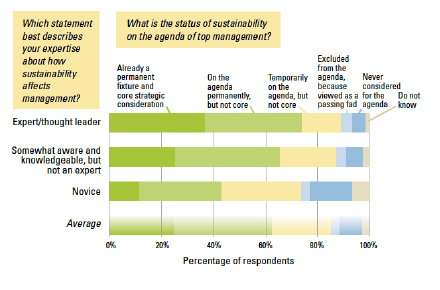Sustainability Moving Into the Agenda of Top Management
How much are top managers paying attention to sustainability questions?
According to respondents to the second annual Sustainability & Innovation Global Executive Study — a collaboration between MIT Sloan Management Review and the Boston Consulting Group — the answer depends on how much they know about it. The more they know, the more they pay attention.
People who identify themselves as sustainability “experts” are more than two times as likely as sustainability “novices” to say that sustainability is “already a permanent fixture and core strategic consideration.”
The Question: What is the status of sustainability on the agenda of top management?

Cuts of the survey pool show several variances in how sustainability is assessed. For instance, respondents at very large companies indicated sustainability was a much bigger concern than those at smaller companies.
Results across the survey suggest that for experts whose businesses have already begun acting on sustainability-driven strategies, sustainability is a sort of perpetual motion machine — the more they do, the more they learn, the more advantages they achieve, and the more they realize that there is more to do.
These findings probably come as no surprise to Jessica L. Bier and James Hacker, of Deloitte Consulting LLP. In a piece published today at environmentalleader.com, “Raising the Level of Sustainability: Stakeholder Alignment and Cultural Change,” Bier and Hacker write, “One of the major challenges in making a sustainability program truly sustainable is stakeholder engagement, both internal and external.”
Their main point: “meaningful behavior change is more likely to occur when people are both enlisted in the solution and when they know their performance is being measured.”
Some experts have told MIT SMR that the gap between sustainability “embracers” and “cautious adopters” presents a challenging and consequential question for CEOs. Does the divergence of opinion between experts and novices reflect a fundamental disagreement about sustainability’s significance? Or do those opinions simply illustrate how views naturally evolve as managers learn more (or as they begin to get measured by new metrics, as Bier and Hacker suggest)?
If the differences come from how much information leaders have, then there are easy-to-spot educational solutions. But if they come from a fundamental disagreement about sustainability’s significance, then it’s harder to say how leaders can change an organization’s cultural viewpoint.

Comment (1)
Andrew McFarland